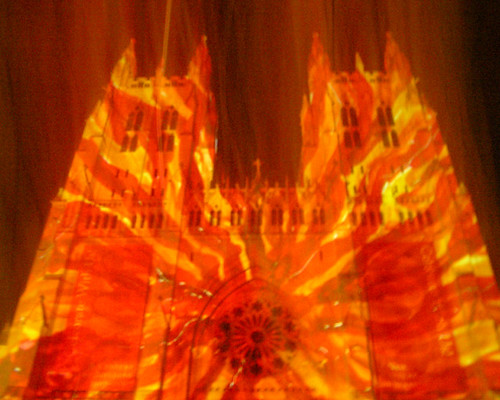In a carefully crafted and very, very long (172 pages, including two concurrences) 4-3 majority opinion, the court specifically said its ruling was on the narrow issue of what to call domestic partnerships in California, and they went to pains to extricate themselves from the issue of whether or not there should be gay marriages, acknowledging that there is still a societal difference of opinion on that matter. So, for the Religious Right doomsayers, this isn't a blatent case of judicial activism (after all, six of the seven justices are Republican appointees), as domestic partnerships already exist in California—the court did not "legalize" gay marriage.
The court was very careful to point out that this applies only to civil marriages and domestic partnerships; nothing in the ruling is to be construed as requiring any church or religious organization to recognize or perform same sex marriages.
California is in the position of being one of only a tiny number of states wherein there are legislative statutes on the books allowing heterosexuals to marry and homosexuals to enter into domestic partnerships (some states use the term "civil unions"). They also don't have a Religious Right constitutional amendment yet (definition of marriage as heterosexual only), but merely a state referendum-imposed Religious Right statute. The court observed that the existing California domestic partnership laws embued gay couples with most of the rights of straight married couples, so they sought to answer the question as to whether or not the state had a compelling interest in maintaining "separate but equal" parallel systems. In dicta, the court found a fundamental right of gay couples to marriage, that the "separate but equal" system wasn't equal, and that the State has no compelling interest in prohibiting homosexuals from marrying. The crux of this ruling is that the referendum imposing the Religious Right definition limiting marriage to one male and one female is unconstitutional under California's state constitution and its equal protection clause.
For years, I've made the argument that marriage is a religious institition that gave an imprimatur to the archaic concept of ownership of females by fathers and husbands, and that governments have no business sanctioning marriage or other religious ceremonies. I submit that if a government wants to recognize a gender-neutral "domestic partnership," that would be fine, but they should not be doing "marriages." The court addressed this issue, too, and decided that, rather than stripping heterosexual couples of the title of marriage, it was better just to use the familiar term and extend marriage to homosexuals.
Now, all those people who were married by the handsome San Francisco mayor Gavin Newsom in 2004 will still have to get re-married, since the California Supreme Court invalidated and voided those marriage licenses in an earlier case (Lockyer v. City and County of San Francisco). The question in my mind, though, is what happens to lawful domestic partners in California today. Are they now deemed married? Or do they have to go get a new marriage license or certiticate? Perhaps one of you California lawyers can weigh in on this topic.
We should also note that the Religious Right has already submitted a petition trying to get a constitutional amendment on the November general election ballot. Governor Schwartzenegger has publicly said he will oppose such an amendment, but if it gets on the ballot, there will be a high risk that it could pass.
And I still get confused when my gay friends get married.....what do I call them? Are they both husbands? And, with lesbians, which one is the husband and which one is the wife, or are they both husbands? ;-)










